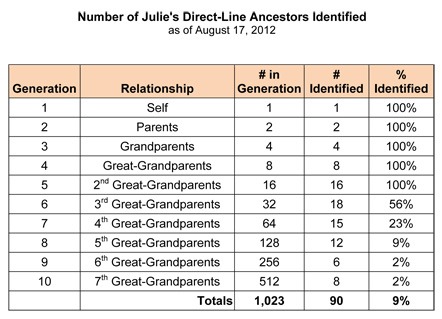 Crista Cowan had an interesting post on the Ancestry.com blog yesterday, entitled Family History All Done? What’s Your Number? This gist of the post is that we are never really done with our family tree. If you were to go back ten generations on both your maternal and paternal lines, you would have 1,023 people, which would bring you back to your 7th great-grandparents…and that’s just your direct-line ancestors!
Crista Cowan had an interesting post on the Ancestry.com blog yesterday, entitled Family History All Done? What’s Your Number? This gist of the post is that we are never really done with our family tree. If you were to go back ten generations on both your maternal and paternal lines, you would have 1,023 people, which would bring you back to your 7th great-grandparents…and that’s just your direct-line ancestors!
Some of us may never get beyond the first few generations for a variety of reasons, some of which include limited funds, lack of available records, not enough time, or simply not knowing where to look. There may be a time when all the stars are aligned and we can push back a little farther, but until then, it’s important to remember that there is more to family history research than just those direct-line ancestors. And, in many cases, researching an entire family group can help you push back to those obscure generations.
Below is my chart outlining the number of direct-line ancestors that make up a generation, how many I have positively identified, and the percentage of those identified.

In putting this together, I realized that I have five generations of direct ancestors fully identified, and am about halfway through the sixth generation. This doesn’t mean I am DONE with these people, it just means that I have positively identified who they are. There is still so much work to be done on them if I want to be able to tell the story of each individual’s life.
I’m certainly no where near Crista’s 36% overall, and I’m okay with that. I have only been doing this since 2007, so just about five years, and I think I’m off to a great start!
What I’ve also realized is that when I first started, I was more like a planter; I planted the seeds and made the darn tree grow. Over the last three years, I’ve been taking more of a “landscaping” approach and have been working on shaping the tree and its surroundings. Naturally the tree continues to grow, but I am very careful about what goes in the tree, making sure that every branch and every leaf is in its proper place.
In case you are curious about how I came up with my numbers, I ran an Ancestry Chart report in Legacy (making sure to include the generation numbers), printed it out, and then counted up every individual in a particular generation. This was the easiest thing I could think of.

This comment has been removed by the author.
Great idea, Julie. I think I’ll figure mine out.
Julie,
What a great chart. Hadn’t thought of doing that. But, it was a great exercise to pause a moment to see where I am. Thank you.
Ran my numbers, base on your chart and I am at 25%.
My “brick wall” is in the 7th generation, where I am looking for my ancestor who came to the colonies between 1650 and 1674 as a “young lad”. I am hoping that a DNA Project will help sort out the ancestors in the UK, to go back further. I have seen hints back to the 1300’s in that line, but can’t untangle the 1600 – 1650 time frame (yet).
Thank you,
Russ
@Russ, good luck on untangling that seventh generation!
Ran the numbers by compueting the unique names count and it was not too bad:
Gen 4 15 unique names 100%
Gen 5 31 unique names 100%
Gen 6 63 unique names 100%
Gen 7 119 missing 8 names
Gen 8 193 missing 62 names
Gen 9 295 missing 216 names
Gen 10 432 missing 591 names.
Wait there is a problem as those are unique names not the number of missing people. I realized that some of the names repeat so now I have to find how many ancestors I have that I have multiple lines to! I guess too many ancestors lived on Nantucket.